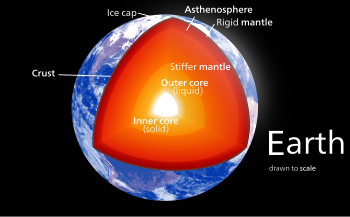地幔
| “地幔”的各地常用名称 | |
|---|---|
| 中国大陆 | 地幔 |
| 台湾 | 地函 |
| 港澳 | 地幔 |
地幔是行星体内部结构的一层,其下以核为界,上以地壳为界。地幔由岩石或冰组成,通常是行星体中最大、质量最高的一层。地幔是经历密度分化的行星体的特征。所有类地行星(包括地球)、一些小行星和一些行星的卫星都有地幔。
例子
[编辑]地球
[编辑]
地球的地幔是地壳和地球外核之间的一层硅酸盐岩石。它的质量为4.01 × 1024公斤,占地球质量的67% [1]。它的厚度为2,900千米(1,800英里)[1],约占地球体积的84%。它主要是固体,但在地质时间中表现为粘性流体。地幔的部分熔融在中洋脊海洋地壳,在俯冲带产生大陆地壳[2]。
其它行星
[编辑]水星有一个大约490千米(300英里)厚的硅酸盐地幔,仅占其质量的28%[1]。金星的硅酸盐地幔大约2,800千米(1,700英里)厚,约占其质量的70%[1]。火星的硅酸盐地幔大约1,600千米(990英里)厚,占其质量的约74〜88%[1],并可能以纯橄无球陨石为代表[3]。
卫星
[编辑]木星的卫星,埃欧、欧罗巴、和盖尼米德都有硅酸盐的地幔;埃欧的硅酸盐地幔厚约1,100千米(680英里),上面覆盖着火山岩地壳,盖尼米德的硅酸盐地幔厚约1,315千米(817英里),被厚约835千米(519英里)的冰覆盖着,欧罗巴硅酸盐地幔厚约1,165千米(724英里),被厚约85千米(53英里)冰和可能的液态水覆盖着[1]。
地球的卫星,月球的硅酸盐地幔厚度约为1300〜1400公里,是玄武岩海的来源[4]。月球地幔可能暴露在南极-艾特肯盆地或危海[4]。月球地幔在大约500千米(310英里)深处有着地震不连续性,很可能与成分的变化有关[4]。
泰坦和特里顿都有一个由冰或其他固体挥发性物质构成的地幔[5][6]。
小行星
[编辑]一些最大的小行星有地幔[7];例如,灶神星有一个硅酸盐地幔,成分类似于陨石类型的古铜无球陨石[8]。
相关条目
[编辑]参考资料
[编辑]- ^ 1.0 1.1 1.2 1.3 1.4 1.5 Katharina., Lodders. The planetary scientist's companion. Fegley, Bruce. New York: Oxford University Press. 1998. ISBN 978-1423759836. OCLC 65171709.
- ^ What is the Earth's Mantle Made Of? – Universe Today. Universe Today. 2016-03-26 [2018-11-24]. (原始内容存档于2020-07-30) (美国英语).
- ^ Swindle, T. D. Martian Noble Gases. Reviews in Mineralogy and Geochemistry. 2002-01-01, 47 (1): 171–190 [2024-06-02]. Bibcode:2002RvMG...47..171S. ISSN 1529-6466. doi:10.2138/rmg.2002.47.6. (原始内容存档于2023-06-25) (英语).
- ^ 4.0 4.1 4.2 Wieczorek, M. A. The Constitution and Structure of the Lunar Interior. Reviews in Mineralogy and Geochemistry. 2006-01-01, 60 (1): 221–364 [2024-06-02]. Bibcode:2006RvMG...60..221W. ISSN 1529-6466. doi:10.2138/rmg.2006.60.3. (原始内容存档于2024-04-25) (英语).
- ^ Layers of Titan. NASA. 23 February 2012 [7 October 2015]. (原始内容存档于14 September 2015).
- ^ Triton: In Depth. NASA. [16 October 2015]. (原始内容存档于17 November 2015).
- ^ Griffith Observatory – Pieces of the Sky – Meteorite Histories. www.griffithobservatory.org. [2018-11-24]. (原始内容存档于2020-02-10) (美国英语).
- ^ Reddy, Vishnu; Nathues, Andreas; Gaffey, Michael J. First fragment of Asteroid 4 Vesta's mantle detected. Icarus. 2011-03-01, 212 (1): 175–179. Bibcode:2011Icar..212..175R. ISSN 0019-1035. doi:10.1016/j.icarus.2010.11.032 (英语).
进阶读物
[编辑]- Don L. Anderson, Theory of the Earth (页面存档备份,存于互联网档案馆), Blackwell (1989), is a textbook dealing with the Earth's interior and is now available on the web. Retrieved 2007-12-23.
- Jeanloz, Raymond. Mantle of the Earth. Haraldur Sigurdsson; Bruce Houghton; Hazel Rymer; John Stix; Steve McNutt (编). Encyclopedia of Volcanoes. San Diego: Academic Press. 2000: 41–54. ISBN 978-0-12-643140-7.
- Nixon, Peter H. (1987). Mantle xenoliths: J. Wiley & Sons, 844p., (ISBN 0-471-91209-3).
- Donald L. Turcotte and Gerald Schubert, Geodynamics, Cambridge University Press, Third Edition (2014), ISBN 978-1-107-00653-9 (Hardback) ISBN 978-0-521-18623-0 (Paperback)
外部链接
[编辑]- The Biggest Dig: Japan builds a ship to drill to the earth's mantle – Scientific American (September 2005) (archived 17 October 2007)
- Information on the Mohole Project (archived 2 November 2015)
